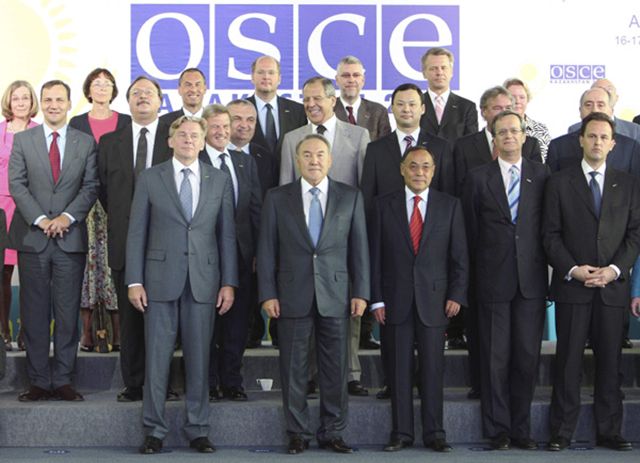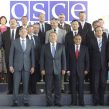
Moscow Prepares OSCE “Reform” Proposals for the Summit in Kazakhstan
Publication: Eurasia Daily Monitor Volume: 7 Issue: 150
By:

Ahead of the OSCE summit under Kazakhstan’s chairmanship, Russian officials are resurrecting the agenda of “OSCE reforms” to reconfigure the organization in line with Russian foreign policy objectives. The reform proposals date back for the most part to 2004 and have been promoted since then unsuccessfully by Moscow, seconded at times by a few loyalist CIS member states. The OSCE’s upcoming summit in Kazakhstan, the first since 1999, provides Russia with a higher-level forum in which to promote its reform proposals in a slightly updated edition.
Russian Foreign Minister, Sergei Lavrov, adumbrated that agenda during the OSCE’s informal ministerial meeting in Almaty (ITAR-TASS, July 17), after having provided Russia’s Duma with a detailed preview of the “OSCE reform” proposals (Russian Ministry of Foreign Affairs transcript, www.mfa.ru, May 24). Konstantin Kosachev and Mikhail Margelov, chairmen respectively of the Duma and the Federation Council international affairs committees, elaborated on the proposals in statements timed to coincide with the Helsinki Final Act’s 35th anniversary (RIA Novosti, Interfax, August 1, 2).
The proposals continue to focus on casting the OSCE in the role of a security actor (calling this a “strengthening the OSCE”); reducing its democracy-promoting role (without calling this a “weakening”); expanding the authority of the OSCE Permanent Council (where Russia holds veto power) to cover the organization’s autonomous agencies and programs, where Russia’s veto operates indirectly or not at all; and turning the OSCE into a fully-fledged international organization (a status the OSCE does not possess), which would strengthen Russia’s international influence, if the OSCE is reconfigured in line with those proposals.
Those statements describe the OSCE as an “obsolete” organization, in danger of “ceasing to exist,” but which can yet be “salvaged” through the Russian-proposed reforms. Invoking the OSCE’s “comprehensive security” concept (military-political, economic, humanitarian), Moscow calls for a fundamental “re-balancing.” It proposes moving the political-military dimension to center-stage, while downgrading and de-funding the humanitarian dimension (democracy and human rights). On the economic dimension, Moscow seems resigned to what it sees as a “European Union monopoly” at the OSCE (Margelov cited by Interfax, August 2). However, it seeks to strengthen the OSCE’s political-military dimension in hopes of counter posing it to NATO.
In an update on this agenda, Moscow endorses Kazakh President Nursultan Nazarbayev’s ideas of a common European and Eurasian security space within a global security system. Apparently, it expects in return a Kazakh endorsement of Russian President, Dmitry Medvedev’s, proposal for a new European security architecture, again within a Euro-Atlantic and Eurasian system. Moscow aims to create some overarching structure super ordinate to NATO, and hopes to use the OSCE’s Corfu Process toward that end. Hence, Lavrov’s insistence that Moscow’s proposals submitted through the Corfu Process should be taken up officially at the inter-governmental level at the Astana summit.
On the humanitarian dimension, Russia proposes working out a common set of rules for election-monitoring, synthesizing Russian and Western approaches to holding elections. Moscow wants the OSCE’s Office for Democratic Institutions and Human Rights (ODIHR) to go along with such a “common” methodology. Russia has successfully pressed for ODIHR to monitor elections in Western countries, ostensibly for geographical and political balance. This is one way of de-funding ODIHR by forcing it to spend limited resources in unnecessary missions. Meanwhile, Russia has made it impossible for ODIHR to monitor and evaluate elections in Russia itself.
Moscow has also drafted an OSCE charter that would endow the OSCE with legal personality, and its representatives with diplomatic immunities and privileges, so as to turn the OSCE into a fully-fledged international organization. This would suit Russia’s interests by creating a regional security actor whose operation would fully depend on Russia’s veto power in the Permanent Council. As part of the same reform, Moscow proposes subordinating the OSCE’s field missions to the Permanent Council, thus enabling Moscow to interfere with them directly. In recent years, Russia has been able in some cases to interfere with OSCE field missions, but mostly indirectly, and not by statute.
Russia proposes terminating “off-budget financing” of OSCE activities from contributions by Western countries. Instead, Moscow wants the OSCE to operate on a centralized budget, over the approval of which Russia would exercise a strong influence. This proposal is another way of de-funding OSCE’s humanitarian-dimension activities and its sponsorship of NGO programs.
Some of these proposals are being submitted (mostly, re-submitted with non-essential updates) by Russia on behalf of some CIS and/or Collective Security Treaty Organization (CSTO) member countries. Since Russian officials do not identify the allegedly supportive countries, it seems doubtful that Moscow can line up a bloc of countries behind its proposals to “reform” the OSCE at the Astana summit. Almost certainly, Moscow will attempt to persuade the chairing country, Kazakhstan, to support some of these “reform” proposals, knowing that Kazakhstan cannot do so without compromising the chairmanship’s impartiality.




